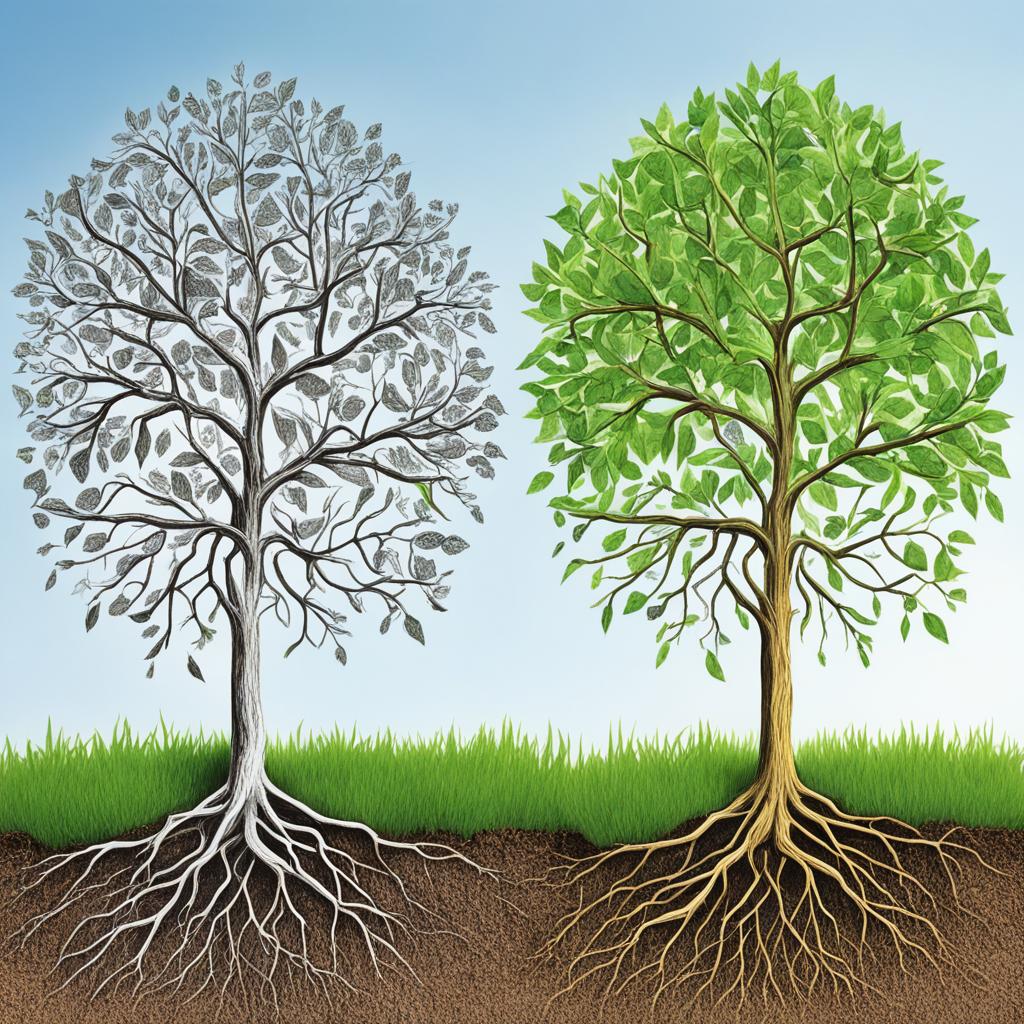Did you know that the human brain undergoes significant changes as we age, impacting our cognitive functions and memory?
As we journey through life, our minds constantly adapt and evolve, shaped by the experiences and the passage of time. Understanding the psychology of aging is crucial for individuals and society as a whole to navigate the challenges and embrace the opportunities that come with growing older. In this article, we will explore the intricate relationship between aging and the human mind, uncovering the fascinating transformations that occur as we age.
Understanding Aging
As we journey through life, the process of aging encompasses both physical and psychological changes. Aging is a natural phenomenon that affects every individual and requires a deeper understanding to navigate it successfully. This section aims to shed light on the concept of aging and explore the intricate interplay between the physical and psychological processes.
Aging is a multifaceted process influenced by various factors such as genetics, lifestyle choices, and environmental factors. Our bodies undergo physical changes, including a gradual decline in organ function, changes in metabolism, and the onset of age-related diseases. Aging affects each person differently; however, one common thread is the impact it has on the psychology of individuals.
Psychological processes play a crucial role in how individuals experience aging. The way we perceive ourselves and the world around us can evolve as we age, shaping our beliefs, attitudes, and behavior. Exploring the psychology of aging offers insights into the cognitive functions and memory processes that are affected by the passage of time.
Various theories attempt to explain the changes in cognitive functions and memory associated with aging. These theories provide a framework for understanding the psychological processes that occur. Some theories propose that cognitive decline is inevitable with aging, while others emphasize the influence of external factors, such as lifestyle and social engagement, in maintaining cognitive vitality.
“Aging is not lost youth but a new stage of opportunity and strength.” – Betty Friedan
The understanding of aging goes beyond the physical and psychological aspects. It considers the impact of social factors on individuals as they age. Social support, relationships, and community engagement play a crucial role in promoting a positive experience of aging. The ability to adapt and maintain a sense of purpose and fulfillment in later life can significantly influence one’s overall well-being.
To better comprehend aging and support individuals through this journey, it requires a holistic approach that integrates knowledge from various fields, including psychology, biology, and sociology. By understanding aging from a multifaceted perspective, we can develop strategies and interventions to promote successful aging and enhance the quality of life for older adults.


Factors Influencing the Psychology of Aging
Multiple factors contribute to the psychology of aging. Genetics can influence an individual’s susceptibility to age-related conditions, while lifestyle choices, including diet, exercise, and mental stimulation, can impact cognitive health. Furthermore, environmental factors such as social support and access to healthcare play integral roles in shaping the psychological well-being of older adults.
Challenging Stereotypes of Aging
Stereotypes surrounding aging can perpetuate negative attitudes and stigmas. Challenging these stereotypes is essential to foster a more inclusive and respectful society for older adults. Emphasizing the diversity of experiences, abilities, and contributions of older individuals is crucial for encouraging positive aging and appreciating the wisdom and knowledge they bring to society.
- Engage in regular physical activity to support both physical and cognitive health.
- Maintain social connections and participate in activities that foster engagement and community involvement.
- Prioritize mental stimulation through activities such as reading, puzzles, and learning new skills.
- Ensure a balanced diet that includes nutrients beneficial for brain health, such as omega-3 fatty acids and antioxidants.
- Seek regular medical check-ups and follow healthcare recommendations to manage age-related conditions.
Cognitive Function and Aging
As we age, it is natural for our cognitive functions to undergo changes. These changes can have a significant impact on our daily lives, affecting our ability to perform tasks and make decisions with the same ease we had in our younger years. Understanding how cognition and aging are intertwined can help us navigate these changes and maintain a high quality of life.
Cognition refers to our mental processes, including our ability to think, reason, learn, and remember. It encompasses a wide range of functions such as attention, perception, language, problem-solving, and decision-making. With aging, some cognitive abilities may decline, while others remain relatively stable or even improve.
One of the cognitive functions most commonly affected by aging is processing speed. Older adults may experience a decrease in the speed at which they can process information, leading to slower reaction times and increased difficulty multitasking. However, it is important to note that this decline is not uniform and can vary from person to person.
Working memory, which involves holding and manipulating information in our minds for short periods, may also show signs of decline with age. This can make it more challenging to keep track of multiple pieces of information or follow complex instructions. However, long-term memory, which involves retaining information over extended periods, tends to remain relatively stable in healthy older adults.
While these changes in cognitive abilities can present certain challenges, it is crucial to emphasize that aging does not necessarily lead to cognitive impairment or dementia. Many older adults continue to lead fulfilling and intellectually stimulating lives, maintaining their cognitive skills through engaging activities, regular exercise, and social interactions.
Engaging in activities that challenge the mind, such as puzzles, reading, and learning new skills, can help keep cognitive abilities sharp as we age. It is never too late to continue learning and expanding our knowledge.
A healthy lifestyle plays a pivotal role in maintaining cognitive function as we age. Exercise, a balanced diet, and adequate sleep all contribute to brain health and can help protect against cognitive decline. Additionally, managing stress and staying socially connected have been shown to have positive effects on cognition and overall well-being.
By understanding the changes in cognitive function that occur with aging, we can adapt our habits and daily routines to support optimal cognitive health. Investing in lifelong learning and adopting a proactive approach to brain health can enable us to continue enjoying vibrant cognitive abilities well into our later years.
Memory and Aging
As we age, our memory is one of the cognitive functions that undergo significant changes. Memory plays a crucial role in our daily lives, helping us remember important information, recall past experiences, and make informed decisions. However, the aging process can impact different types of memory, leading to challenges in retaining and retrieving information.
One type of memory affected by aging is short-term memory. This refers to the ability to hold and manipulate information in our mind for a short period. As we get older, it becomes more difficult to maintain focus and sustain attention, making it harder to remember recent events or details. This may result in instances of forgetfulness or misplacing objects.
Another type of memory that experiences decline with aging is episodic memory. Episodic memory involves remembering specific events or personal experiences, such as a recent family gathering or a vacation. As we age, the retrieval of such memories becomes more challenging, leading to the fading of details and blurring of specific moments.
The changes in memory related to aging can be influenced by various factors, including biological changes in the brain, hormonal shifts, and the impact of chronic diseases. Additionally, lifestyle factors such as stress, lack of sleep, and sedentary behavior can exacerbate memory decline.
However, it’s important to note that not all aspects of memory are affected equally by aging. While certain types of memory may decline, others, such as semantic memory (knowledge of facts and concepts) and procedural memory (skills and routines), tend to be less affected.
“Memory is a way of holding onto the things you love, the things you are, and the things you never want to lose.” – Kevin Arnold
To mitigate the effects of aging on memory, there are strategies that can help maintain cognitive function. Engaging in regular physical exercise, adopting a healthy diet, getting enough sleep, and engaging in mentally stimulating activities can all contribute to preserving memory abilities. Furthermore, incorporating memory techniques such as repetition, association, and visualization can aid in memory retention and retrieval.
Memory and Aging: An Image


This image visually represents the topic of memory and aging. It serves as a visual aid, enhancing understanding and engagement with the content.
Cognitive Reserve and Aging
As we age, cognitive functions tend to decline, impacting our memory, attention, and problem-solving abilities. However, research has shown that engaging in activities that stimulate the brain can help maintain cognitive reserve, mitigating the negative effects of aging on cognition and promoting overall brain health.
Cognitive reserve refers to the brain’s ability to adapt and compensate for age-related changes. It acts as a buffer, allowing individuals to maintain optimal cognitive functioning despite the presence of neurodegenerative processes. By building cognitive reserve, individuals can enhance their cognitive abilities and reduce the risk of cognitive decline.
There are various strategies and activities that can help individuals maintain cognitive reserve as they age:
- Continuing education: Lifelong learning, such as taking classes or pursuing hobbies that require mental effort, can help stimulate the brain and build cognitive reserve.
- Physical exercise: Regular physical activity has been shown to have positive effects on cognitive functions. Engaging in aerobic exercises, such as walking or cycling, can improve blood flow to the brain and promote neuroplasticity.
- Social engagement: Maintaining strong social connections and participating in social activities can help keep the mind active and reduce the risk of cognitive decline.
- Brain training: Engaging in activities that challenge cognitive abilities, such as puzzles, crosswords, or brain training apps, can help improve cognitive functions and build cognitive reserve.
- Healthy lifestyle: Adopting a healthy lifestyle that includes a balanced diet, sufficient sleep, and stress management can contribute to better brain health and cognitive reserve.
“Building cognitive reserve is like saving for retirement. The more effort you put into it earlier in life, the greater the benefits in later years.”
By incorporating these strategies into daily life, individuals can proactively maintain cognitive reserve and mitigate the negative effects of aging on cognition. It’s never too late to start investing in brain health, and the benefits can be significant, leading to improved cognitive abilities and a better quality of life as we age.


Emotional Well-being in Later Life
As we age, emotional well-being plays a crucial role in maintaining overall quality of life. It encompasses a range of factors that contribute to our sense of happiness, fulfillment, and contentment. It is essential to address the emotional needs of older adults to ensure their well-being.
Social relationships are a vital aspect of emotional well-being in later life. Maintaining strong connections with family, friends, and communities helps combat loneliness and provides a support network. Engaging in meaningful social activities and participating in group activities can positively impact emotional well-being.
Mental health also significantly influences emotional well-being. Conditions such as depression and anxiety can affect older adults and impact their overall happiness. It is important to prioritize mental health by seeking professional help if needed, incorporating stress-reduction techniques, and engaging in activities that promote mental well-being.
“Maintaining a sense of purpose and finding joy in everyday life are key components of emotional well-being in later life.”
Life satisfaction is closely tied to emotional well-being. Older adults who perceive their lives as meaningful, fulfilling, and purposeful tend to have higher levels of emotional well-being. This satisfaction can come from various sources, such as accomplishments, relationships, and personal growth.
Engaging in activities that bring joy and fulfillment plays a significant role in fostering emotional well-being. Pursuing hobbies, exploring new interests, and embracing opportunities for personal growth can enhance emotional well-being in later life.


Overall, emotional well-being in later life is multifaceted, encompassing social relationships, mental health, and life satisfaction. By nurturing these aspects and addressing emotional needs, older adults can enhance their emotional well-being and enjoy a fulfilling and meaningful life.
Coping with Aging-related Changes


As we age, it’s natural to experience various changes in our bodies and minds. Coping with these changes can sometimes be challenging, but with the right strategies and mindset, it’s possible to navigate this stage of life with grace and resilience.
1. Stay mentally active: Engaging in activities that stimulate the mind is essential for maintaining mental agility as we age. This can include reading books, solving puzzles, learning a new language, or playing brain-training games. By keeping our brains active, we can support cognitive function and prevent decline.
2. Adapt to new challenges: Embracing change and adapting to new challenges is crucial for personal growth and well-being in later life. Whether it’s trying out a new hobby, learning to use new technology, or exploring different ways to socialize, being open to new experiences can help us stay connected and engaged with the world around us.
“It’s not the strongest of the species that survives, nor the most intelligent, but the one most responsive to change.” – Charles Darwin
3. Maintain a healthy lifestyle: Taking care of our physical health is closely linked to our mental well-being. Regular exercise, a balanced diet, and sufficient sleep are essential for maintaining overall health as we age. Physical activity not only improves cognitive function but also boosts mood and reduces the risk of chronic diseases.
4. Seek social support: Building and maintaining strong social connections is crucial for emotional well-being in later life. Spending time with loved ones, joining social clubs or community groups, and volunteering can provide a sense of belonging and support during the aging process.
5. Practice self-care: Prioritizing self-care is crucial for maintaining a positive mindset and emotional well-being as we age. This can include activities such as meditation, practicing gratitude, engaging in hobbies or interests, and taking time for relaxation and rejuvenation.
Embracing the opportunities of aging
While aging brings its fair share of challenges, it’s important to remember the countless opportunities that come with it. With age, we gain wisdom, perspective, and the freedom to explore new passions and interests. By maintaining a proactive approach to our physical and mental health, embracing change, and seeking support when needed, we can navigate the aging process with resilience and lead fulfilling lives.
Aging and Brain Health
As we age, it’s important to prioritize brain health to maintain cognitive function and overall well-being. The aging process naturally brings changes to our brains, but there are steps we can take to support optimal brain health.
Physical exercise plays a crucial role in keeping our brains sharp as we age. Regular exercise increases blood flow to the brain, promotes the growth of new neurons, and enhances cognitive function. Engaging in activities such as walking, swimming, or dancing not only benefits our bodies but also provides a boost to our brains.
Proper nutrition is another key aspect of maintaining brain health. A balanced diet rich in fruits, vegetables, lean proteins, and whole grains can provide essential nutrients that support brain function. Foods high in antioxidants, such as berries and dark leafy greens, have been associated with a lower risk of cognitive decline.
Incorporating mental stimulation into our daily lives is vital for brain health. Activities like reading, puzzles, and learning new skills can help keep our brains active and flexible. Additionally, engaging in social interactions and maintaining meaningful relationships has been shown to have cognitive benefits.
A captivating way to keep our brains engaged is through brain training exercises that improve cognitive abilities. These exercises focus on enhancing memory, attention, and problem-solving skills. Online programs and mobile apps offer a variety of brain training exercises that can be customized to suit individual needs and preferences.
Quality sleep is essential for brain health. During sleep, the brain consolidates memories and clears away toxins, promoting optimal cognitive function. Establishing a regular sleep schedule, creating a relaxing bedtime routine, and ensuring a comfortable sleep environment can contribute to better brain health as we age.
Stress management is also crucial for maintaining a healthy brain. Chronic stress has been linked to cognitive decline and a higher risk of developing neurodegenerative diseases. Engaging in stress-reducing activities such as meditation, deep breathing exercises, and mindfulness practices can help protect the brain from the negative effects of stress.
By incorporating these strategies into our daily lives, we can promote brain health and minimize age-related cognitive decline. Aging is a natural process, but with proactive care and a focus on brain health, we can age gracefully and maintain our cognitive abilities for longer.
Positive Aging and Mindfulness
As we age, it’s essential to adopt a positive mindset and embrace practices that enhance our mental well-being. One such practice that has gained considerable attention is mindfulness. Mindfulness involves being fully present in the moment, observing our thoughts and feelings without judgment.
Research has shown that mindfulness can have numerous benefits for older adults. By incorporating mindfulness into our daily lives, we can cultivate a sense of calm, reduce stress, and improve our overall psychological and cognitive health.
One of the key benefits of mindfulness for aging individuals is its ability to alleviate age-related anxiety and depression. By focusing our attention on the present moment, we can let go of worries about the past or future, allowing for a greater sense of peace and contentment.
Mindfulness also strengthens our cognitive abilities as we age. By practicing mindfulness meditation, individuals can enhance their attention and concentration, which can be instrumental in counteracting the natural cognitive decline that comes with aging.
The Benefits of Mindfulness for Aging Adults:
- Reduction in stress and anxiety levels
- Improved emotional well-being
- Enhanced cognitive function
- Increase in overall psychological resilience
By incorporating mindfulness into our daily routines, we can experience these benefits and cultivate a greater sense of well-being as we navigate the aging process. Engaging in mindfulness practices such as meditation, mindful breathing exercises, and mindful movement can be excellent ways to start.
“The capacity to be aware of the present moment is a powerful tool that can transform the aging experience, enabling individuals to embrace their current reality and find joy in the smallest of moments.” – Dr. Mindy Carter, Mindfulness Expert
It’s important to note that mindfulness is not a magical solution to all the challenges of aging. It’s a practice that requires consistency and commitment. However, with regular practice, mindfulness can positively impact our overall well-being and contribute to a more fulfilling and meaningful aging process.
So, let’s embrace the power of mindfulness as we age, and experience the profound benefits it can bring to our mental and emotional health.
Strategies for Successful Aging
Aging is a natural part of life, and there are strategies that can help individuals navigate this stage with purpose and fulfillment. By incorporating certain practices into daily life, it’s possible to age gracefully and maintain overall well-being. Here are some practical strategies for successful aging:
Maintaining Social Connections
Staying connected with others is crucial for a healthy and vibrant life as we age. Engaging in social activities, joining clubs or community groups, and fostering relationships with family and friends can help combat feelings of isolation. Building a strong support network and cultivating meaningful connections not only improves mental health but also promotes a sense of belonging and purpose.
Pursuing Meaningful Activities
Engaging in activities that bring joy and fulfillment can significantly enhance the aging experience. Whether it’s through hobbies, volunteering, or pursuing new interests, finding purpose and meaning in daily life can contribute to overall happiness and well-being. By staying active and involved, individuals can continue to grow, learn, and contribute to their communities.
Adopting a Positive Mindset Towards Aging
One of the keys to successful aging is maintaining a positive mindset. Embracing the opportunities and challenges that come with aging can lead to a more fulfilling and satisfying life. Accepting the changes that occur and focusing on the present moment can help individuals navigate the aging process with resilience and optimism.
Remember, successful aging is a multifaceted journey that encompasses physical, mental, and emotional well-being. By implementing these strategies into daily life, individuals can embrace the aging process and make the most out of each stage.
“The longer I live, the more beautiful life becomes.” – Frank Lloyd Wright
Conclusion
In conclusion, understanding the psychology of aging is crucial for navigating the challenges and embracing the opportunities that come with growing older. As we age, our cognitive functions and memory may undergo changes, but this does not define our worth or abilities. It is important for society to support individuals in their journey of aging, creating an environment that promotes positive aging and well-being.
By maintaining cognitive reserve through engaging in mentally stimulating activities and maintaining social connections, we can enhance our cognitive functions and overall quality of life. Additionally, practicing mindfulness can contribute to emotional well-being and promote mental agility in later life.
Successful aging involves adopting strategies such as pursuing meaningful activities, maintaining physical health, and nurturing a positive mindset. With the right support and mindset, aging can be a time of growth, fulfillment, and continued contribution to society. The psychology of aging reminds us that age is not a limitation, but an opportunity for personal and societal development.
